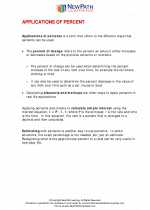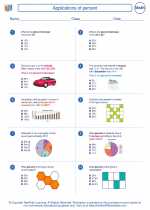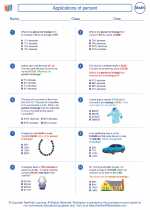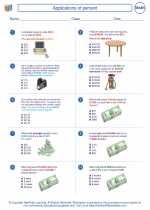Measurement in Mathematics
Measurement is the process of assigning a number to a characteristic or attribute of an object, such as length, weight, volume, or time. In mathematics, measurement plays a crucial role in solving problems and making sense of the world around us.
Units of Measurement
When we measure something, we use units to quantify the attribute we are measuring. For example, we might measure length in inches, feet, meters, or kilometers. Each unit of measurement has a specific size and is used to compare different quantities of the measured attribute.
Common Units of Measurement
- Length: inches (in), feet (ft), yards (yd), meters (m), kilometers (km)
- Weight: ounces (oz), pounds (lb), grams (g), kilograms (kg)
- Volume: fluid ounces (fl oz), cups, pints, quarts, gallons, milliliters (mL), liters (L)
- Time: seconds (s), minutes (min), hours (hr), days, weeks, months, years
Converting Between Units
It's often necessary to convert measurements from one unit to another. To do this, you can use conversion factors. A conversion factor is a ratio that allows you to change from one unit of measurement to another. For example, to convert 1 foot to inches, you would use the conversion factor 1 ft = 12 in.
Measuring Tools
Various tools are used for measuring different attributes. For example, rulers and tape measures are used to measure length, scales are used to measure weight, and graduated cylinders are used to measure volume. Understanding how to use these tools and interpret their readings is essential for accurate measurements.
Study Guide
When studying the topic of measurement in mathematics, it's important to focus on the following key concepts:
- Understanding the concept of measurement and its importance in solving mathematical problems.
- Identifying and using appropriate units of measurement for different attributes (length, weight, volume, time).
- Converting between units using conversion factors and understanding the relationships between different units.
- Practicing with measuring tools and interpreting their readings accurately.
- Applying measurement concepts to real-world problems and scenarios.
By mastering these concepts, you'll be well-prepared to work with measurements in mathematical problems and everyday situations.
.◂Math Worksheets and Study Guides Eighth Grade. Applications of percent

 Worksheet/Answer key
Worksheet/Answer key
 Worksheet/Answer key
Worksheet/Answer key
 Worksheet/Answer key
Worksheet/Answer key
 Worksheet/Answer key
Worksheet/Answer key
